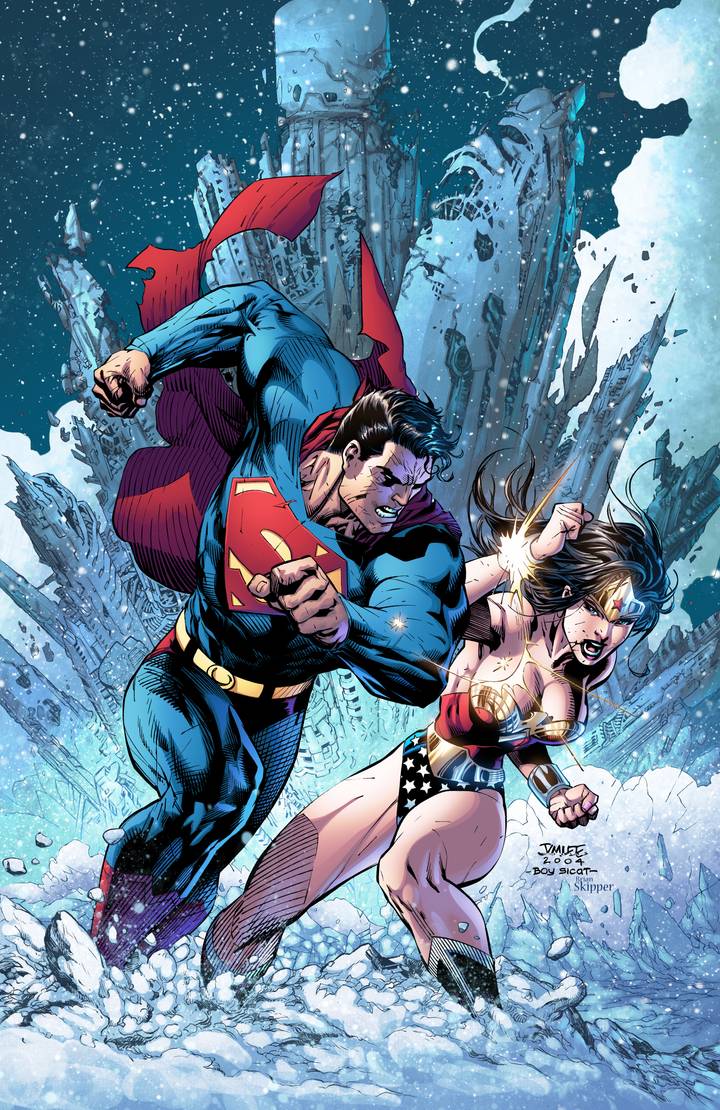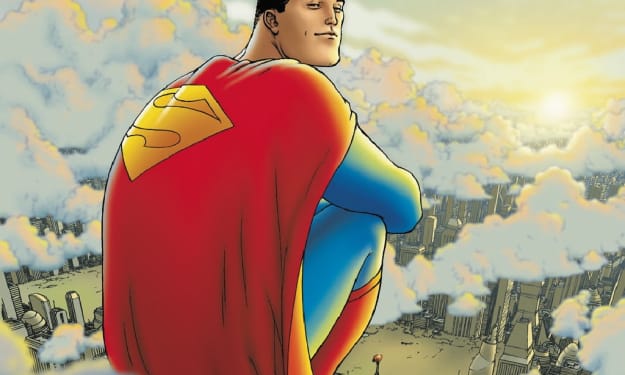
In 2004, DC Comics published a highly ambitious storyline featuring some of the best artists and writers of the DC Comics company: Jim Lee and Brian Azzarello. The storyline featured a highly grim superhero, Superman, confronted with threats of varying nature—personal, political, scientific, and messianic. In the comic book storyline, Superman is tried and put to trial for his attempt at realizing a utopia, a pocket dimension called Metropia designed for the purpose of creating a paradisiacal dimension should the project of Earth fail. Superman in this storyline titled For Tomorrow is as much a man of belief, as he is a man of science and evidence.
The story begins in Superman #204, where The Man of Tomorrow encounters a priest suffering from a terminal stage of cancer called Father Leone. He confesses his sin to him:
"My sin? Was to save the world."

Superman #204
Superman is viewed as a savior, a messiah. One who is willing to make the ultimate sacrifice in order to save the world, and actually change the world. Superman's presence changes the world, history, human affairs, and political events. He is God on Earth, and his might shows that he cannot be opposed except by cosmic powers like alien invaders, elemental powers such as the Earth, Fire, Water, and Wind elementals, or intergalactic forces like the Justice League. The main function of Superman in this narrative is to pose as a messiah, a savior who, because of his failure, is misunderstood and unable to relate to humanity, and his humanity.
The Vanishing causes the disappearance of a million people over the world. Superman goes on a space mission to save Green Lantern Kyle Rayner from an alien invasion, after having heard his voice on Earth millions of miles away only to return to find out that everywhere on Earth: "When every signal in every language is reporting exactly the same thing."
The Vanishing was an unexplained phenomenon that robed Superman of his "rhythm." His wife. He could no longer hear his wife's heart beat. Lois Lane vanished in the event that caused the disappearance of a million people on Earth.
The rest of the comic book storyline is Superman's visitations to Father Leone, and of his confession of his role in the event: Superman created a pocket dimension called Metropia using advanced Kryptonian technology then made himself forget of its existence. Superman traced the weapon to a war zone in the Middle East as the epicenter of the Vanishing, which triggered the event during his absence.
The problem that For Tomorrow raises is that of using advanced science in order to alter human politics and create a utopia. The presence of an alien, an immigrant from another planet that brings the promise of a better world is alluring. At the same time, it presents the problem actually of the comprehension of what such a promise is envisioned to be. Superman's dream of a utopia in For Tomorrow is only proven to be a dream of resurrecting Krypton on Earth, and of an attempt by an alien to adapt to a harsher climate of civilization where human life is inherently primitive.
"I have faith."

Superman #211
Superman eventually travels to Metropia. In Superman #211, Superman faces the fearsome foe of Wonder Woman, and reveals with her his decision to travel to The Vanishing to recover the people that disappeared. Wonder Woman retorts that he has no proof that he can save the people. Superman answers: "I have something stronger; I have faith."
For Tomorrow presents a problematic characterization of Superman. Superman is a product of science, of the advanced Kryptonian physiology of the planet Krypton under the yellow sun. Here, Superman is presented as a man of faith who believes that he can actually save people against overwhelming odds—Wonder Woman, the Justice League, public opinion, The Vanishing, the loss of his wife—in an almost religious dedication to his cause. There are a lot of religious allusions, such as The Flash stating that the media is crucifying Superman over his intervention in a nation's affairs in the Middle East as a result of his trace of the Vanishing to the weapon he created that caused it, upon his absence from Earth to save Kyle Rayner Green Lantern—there, he meets a cybernetically enhanced mutant called Equus whom he confronts over the weapon; Superman frequently confesses his sins to a Catholic priest though, without absolution.
Superman is portrayed as broody, in a sense, as almost depressed, and lacking in the joy of life as a result of the loss of his wife, whom he mourns. This is a symptom of a savior complex, of one carrying the burden of the world on his shoulders, and of his attempt at making sense of his place in the world.
Should Superman have created a pocket dimension that would function as a utopia for Earth?
For Tomorrow is essentially an experiment for DC Comics in the needed revamping of the character of 70+ years of activity functioning in American pop culture. It takes a lot of creative risks such as having Superman question himself, and engage in philosophical debates with a priest. It is certainly an attempt to cater to the religious population of America, and of functioning as a slogan, a communication of Superman to the Christians on the figure of Superman as a true messiah who can answer Earth's aspirations of For Tomorrow.
The storyline leaves some threads unanswered such as who, apart from Superman, is the actual villain of the story. It is definite that Superman functions as antagonist to the story, or perhaps as its anti-hero in his attempt at being its messiah. There is, in For Tomorrow, a mysterious organization that sets events in motion, and that attempts to control the Earth by ridding the world of Superman, whether through the Middle East war, Equus, or the confrontation with the elementals, all the way into Metropia, which it invades at the behest of General Zod.
For Tomorrow answers the question of God, and of whether it is possible to live in a world without symbolic Evil. The battle between Superman and Zod in Superman #215 shows that Evil always finds a way. The problem is not so much the eternal battle between Good and Evil as it is the temptation to control. Control is the problem that totalitarian governments face in their attempts at creating a utopia, and a genetically pure population of super powered individuals who work towards the benefit of the group in a Communistic utopia.
Such a temptation, is never acceptable!
About the Creator
Patrick Ouandji
Biochemistry major from Texas State. Pre-med student. Fluent in English, Spanish (conversational), and French. Member of Justice League of America.
The place of the super feat!






Comments
There are no comments for this story
Be the first to respond and start the conversation.